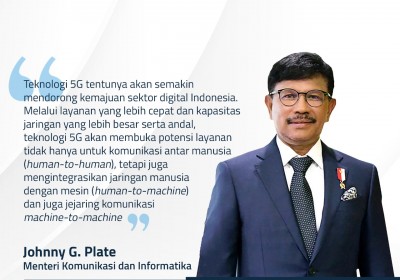Indonesia’s First 5G Network Proof of Successful Digital Transformation Effort
June 10, 2021
JAKARTA – The deployment of Indonesia’s first official 5G network is proof that the country’s digital transformation efforts are moving smoothly and in line President Joko Widodo’s National Digital Transformation Acceleration plans. The 5G network will be simultaneously rolled out in commercial areas as well as other priority areas to complement the existing 4G network.
Over the past few years, the government has performed no less than 12 tests to prepare for the rollout of 5G in the country. One of the more notable tests was during the 2018 Asian Games, when a trial 5G network was made available to the public. At the beginning of 2021, the Ministry of Communication and Information (Kemkominfo) also held a tendering auction for the 2.3 GHz frequency.
Communication and Information Minister Johnny G. Plate explained that the regulatory aspects of 5G have also been prepared well. Minister Johnny said that the 5G rollout is in line with the demands made by President Joko Widodo to accelerate digital transformation efforts in Indonesia as part of the Job Creation Law (UU Cipta Kerja) implementation and its related policies.
“The Job Creation Law provides the basic legal foundation for the 5G rollout, primarily regarding rules on active and passive infrastructure sharing and also frequency sharing, which will help the deployment of 5G in the field,” the minister elaborated through a written statement on Monday (24/5).
The 5G rollout is also a sign that Indonesia has now entered the simultaneous operations phase, operating both 4G and 5G networks. Minister Johnny insisted that the 5G network will not affect the performance of the 4G network, which is already used widely by the public. “Because this is the early stages, the 4G network is still needed as a basis of 5G operations,” he said.
The minister added that this new technology is expected to help push the development of Indonesia’s digital sector. “Through better service and greater network capacity, 5G will improve not only human communication but also help integrate the human network with machines and also integrate machine communication networks,” he said.
In order to ensure the efficient rollout of 5G, the Kominfo states that Indonesia would require a frequency spectrum allocation of at least three layers: low band, middle band and high band. “The high band layer is also known as the Super Data Layer or the Wave Band millimeter, encompassing high frequency bands above 6 GHz, which is often used to support industrial automation and strengthen the penetration of fixed broadband,” Minister Johnny said.
The minister also hopes that the implementation of 5G in Indonesia will help provide fairer and more diverse telecommunication access that can help close the digital divide and enhance digital literacy, as well as push for a more productive use of the internet to strengthen the economy.
To achieve this, Minister Johnny is encouraging telecommunications operators to be part of the 5G revolution by helping accelerate its implementation in Indonesia.
“That is why we are inviting all telecommunications operators to ensure the successful implementation of 5G in Indonesia, and together, we can achieve the goal of a more connected, digital and prosperous Indonesia,” he declared.
Indonesia’s Research Institutions Supporting the Development of the Electric Vehicle Industry
Indonesian Muslim Fashion and Cosmetics IKMs Shine at Dubai World Expo 2020
Govt Steps Up UMKM Transformation Efforts in the Midst of Pandemic Slowdown
Govt Encourages Promotion of IKM Products in Digital Era
Government Begins Developing Maritime Training Center in Makassar
Tweets by IDDevForum
